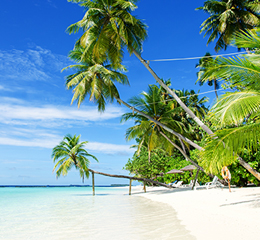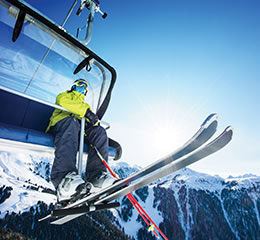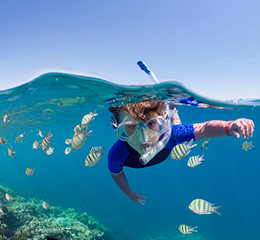Select a region (Please consider current travel restrictions)
Corsica

Destination overview
Corsica is one of the largest islands in the Mediterranean off the south coast of France and is the ideal destination for beach lovers, culture buffs and outdoor enthusiasts alike. It combines vast stretches of shoreline with the beauty of the mountains, with plenty of activities to keep your body fit and your mind enriched. Emerging out of the Mediterranean like an impregnable fortress, Corsica resembles a miniature continent with astounding geographical diversity. Within half an hour, the landscape transforms from glittering bays, glitzy coastal cities and fabulous beaches to sawtooth peaks, breathtaking valleys, dense forests and enigmatic hilltop villages.
Corsica is located in the heart of the Mediterranean, 170 kilometres off the French coast and 80 kilometres from Italy. This French island is the most varied and green of the Mediterranean. The scenery that unfurls along the island’s crooked roads will have you constantly stopping to admire the view and capture it on film.
With its dramatic scenery and fascinating history, Corsica is a land full of character. With natural landscapes of granite and schist, the island is dotted with secret corners which are dramatic and evocative in atmosphere. The striking cliffs of the Calanche de Piana, the fascinating archaeological ruins at Filitosa, and the beauty of the Scandola Reserve are all examples of landscapes marked by time and sculpted by the passing years.
Explore the island through its renowned craftsmen and women who demonstrate their unique skills through the production of knives, essential oils or red coral jewellery. And as you make your way around the island, take time to stop and eat at one of Corsica’s charming village inns.
Kalliste – the name given to the island by the Greeks – also attracts increasing numbers of tourists keen to follow in the footsteps of Napoleon Bonaparte or Pasquale Paoli. As a result of its tumultuous past, Corsica is also home to some exceptional historical buildings, such as the Genoese towers, Romanesque and Baroque churches and fine mansions, which make it a fascinating place to visit.
Corsica is the island of superlatives. Little deserted creeks or vast gulfs, with over 1,000 kilometres of coastline, the infinite diversity of its pearly beaches borders some of the clearest waters in the world. Its centre is home to the highest mountains in the Mediterranean while nature preserves provide peace and protection to rare fauna and vast forests with more than 2,000 plant species.
Corsica does not conform to the perceived notion that people have of a Mediterranean island, because nowhere else is as green as Corsica - from the forests of Laricio pines and magnificent emerald mountain lakes, right through to the aromatic maquis scrubland, the refreshing highland pastures and vineyards of its wine growing regions.
This ‘mountain in the sea’ is worthy of its name, with 120 peaks that soar above 2,000 metres and which remain snow-capped right up until springtime. The 25 rivers and streams that criss-cross this land make it the most well-irrigated island in the Mediterranean.
The Mediterranean has drawn the contours of the island to satisfy visitors’ every desire - the rocky inlets of Pana; long beaches of fine sand on the Costa Serena; wild creeks in the south; and the broad gulfs of Balagne and Ajaccio.
If you love the beach, then you will love Corsica as it has some fabulous beaches such as Palombaggia Beach, one of the top beaches in Europe, with golden sands and crystal clear waters. This is a great location for water sports such as wind surfing, jet skiing, kayaking and diving, or for just relaxing on the sand.
The mild climate in Corsica means that the sea stays warm and you can swim well into the autumn months. There are plenty of superb beaches to try including Marinella Beach to the north; Parata Point, which is overlooked by a Genoese watchtower; and the beaches of the Capo di Feno with turquoise waters and a wild landscape that makes this place a favourite with surfers.
Corsica also has plenty of good family beaches like the Golfe di Sogno Beach and Santa-Giulia Beach close to resort towns such as Porto-Vecchio.
Corsica is a great destination for golf, and is home to the Golf de Spérone which overlooks the Mediterranean and is regarded as one of Europe's best courses. Golf enthusiasts will also enjoy some of the smaller nine-hole golf courses like Golf du Reginu and Bastia Golf Club.
The Gulfe De Porto is a UNESCO World Heritage Site and a recommended day trip from Corsica, with regular boat trips departing from the town. Here you can visit the eroded rock formations of the Les Calanques and the unique fortress town of Banifacio.
The Capital of Corsica, Ajaccio, rises up from one of the most beautiful gulfs in the world on the west coast of the island and is set against a backdrop of majestic mountains that are often snow-capped until spring. This lively, elegant town was the birthplace of Emperor Napoleon Bonaparte in 1769.
Following significant renovation works over the last few years, one of France's most important museums outside of Paris, the Fesch Palace in Ajaccio re-opened in June 2010. The architecturally stunning 19th Century Palace hosts the largest collection of Italian paintings after the Louvre and constitutes one of the most important collections to have ever existed. It includes Botticelli, Véronèse, Poussin, Titien, as well as one of the most remarkable series of portraits of the Bonaparte family.
Bonaparte House, now the National Museum, is located in the heart of the Genoese part of Ajaccio. Napoleon Bonaparte was born in this house in August of 1769. The collection includes furniture belonging to the family dating from the end of the 18th Century as well as memorabilia, portraits, weapons and documents relating to Napoleon and his family in Corsica.
And while in Ajaccio take the ‘little train’ from the town to Corte (in the centre of the island). The scenery is stunning.
DAE Resorts in this Destination
Ready to go more places?
Discover where 7Across members are exploring.
Browse below to see some of the resorts other members have recently booked and spark your curiosity.
- Exchange
- Bonus week
- Rental































